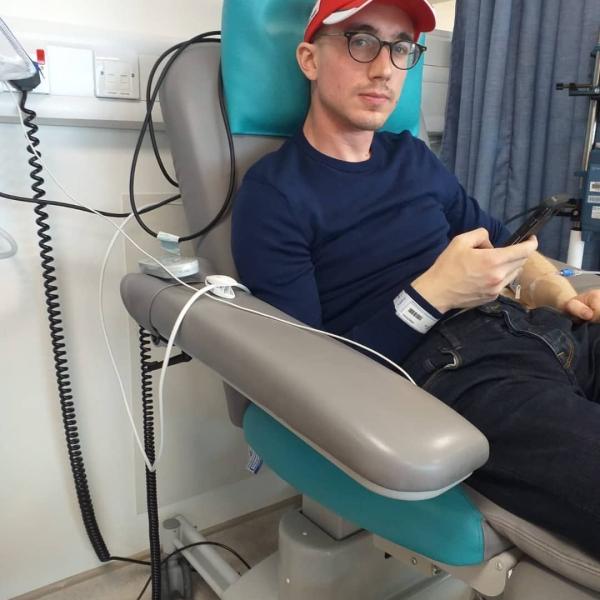
In April 2019, just before his 30th birthday, Kevin Hiney noticed a slight lump on his right testicle. “There was a lot going on at the time, I was splitting my time between Dublin and Brussels, and I was also moving in with my girlfriend– I was in a bit of denial and I just told myself to ignore it and it would go away.”
In hindsight, Kevin is now strongly advocating for people, especially men, not to dismiss any persistent changes in your body and instead, calling on people to raise these issues with their GP. “You can try convince yourself it’s nothing, but the reality is, the sooner you deal with whatever it is, the better. Don’t live with the regret of thinking: I should have gone the doctor sooner.”
By July 2019, the lump had gotten much worse, and Kevin was experiencing sporadic periods of pain. “I was back from Brussels for a week, and I took myself to the ED in the Beacon. I went in for 9am on the 17th of July and by 11am, they told me there was a tumour on my testicle, but they would have to await further tests to give me a full diagnosis. From then on, I was straight into test after test and scan after scan. There was an ultrasound, some CT scans after which it emerged that the cancer had metastasised and spread to my abdomen. Within two days, I was into surgery but it was a further three weeks before my chemotherapy began.”
“You’ll be done by Christmas they said, they just never said which Christmas!”
Reflecting on receiving his diagnosis, Kevin says “it’s like a suddenly being forced onto a new track and your life taking a very different direction. I remember having to phone my parents and tell them the news andwas always very conscious of trying to protect the people around me and not scare them. The fallout from cancer really touches everybody you’re connected to. I met a friend for a catch up between my surgery and chemo starting and his reaction was so visceral, just the word ‘cancer’ was so scary for him, he was asking if I was going to die and it was me doing the reassuring telling him that the survival rate is good, the treatment will be tough but I’ll come through it.”
“For me, I don’t deal well with uncertainty and information gaps, so how I coped was by consuming information, reading up on the facts and the data. I remember my first surgeon giving me a copy of the Irish Cancer Society’s guide to testicular cancer which was hugely helpful but also only a starting point. The factsheets, medical journals, the personal stories of others who have experienced cancer and so on, were all hugely helpful so that I could help those around me to be calm as well.”
As Kevin began his chemotherapy in August 2019, he recalls a comment from a member of his medical team: “’you’ll be done by Christmas’ they said, they just never said which Christmas!”
After his first round of chemotherapy, further scans showed anomalies dotted from Kevin’s pelvis through to his chest. “It took a further series of biopsies, guided by CT and ultrasound, to come to the conclusion that they were a type of tumour that is unresponsive to chemo but which grow similar to benign tumours, rather than fast-growing cancerous ones. I’d need major surgery to remove them,” explains Kevin.
Due to the complexity of the of surgeries required, Kevin would need to go abroad to London. His first consultation with the urologist at the Royal Marsden Hospital took place on the 10th of March 2020, only for Covid restrictions to disrupt his treatment. “My surgeon was uncontactable for many weeks as he happened to be the chief of surgery. It wasn’t until May that he made contact again.” Navigating his way from Brussels to Dublin and then onto London in the midst of lockdowns and isolation periods was challenging, but eventually his surgery journey began with a major operation. “First up was an RPLND (Retroperitoneal lymph node dissection) to remove enlarged lymph nodes at the back of my abdomen,” outlines Kevin.

"“After recovering, I was back over to London in September for round 2 – this time it was a thoracotomy to go into my chest and remove further benign tumours along my spine and under my diaphragm."
After complications during this surgery, Kevin needed to be readmitted to hospital for nearly a month on his return to Ireland. “After recovering, I was back over to London in September for round 2 – this time it was a thoracotomy to go into my chest and remove further benign tumours along my spine and under my diaphragm. Thankfully, my recovery from this second surgery was much more straightforward.”
Following his two rounds of surgery, further scans in December 2020 showed that there was an anomaly on Kevin’s pelvis that would ultimately require more surgery but there was no immediate rush back under the knife. “So in 2021 I went back to living my normal life in Brussels, with this lingering question of these marks still persisting on my pelvis hanging over me. I was reassured that they were small and weren’t fast-growing so there was no mad rush to get them out, but they would eventually need to be dealt with. I took up liaising directly with my surgeon in London and into 2022, we looked at getting something scheduled but I changed jobs in autumn 2022, so it wasn’t until this past summer, in June 2023, when I went to have what is hopefully my final surgery. In the words of my surgeon – ‘that should be that!’ – so I’m really looking forward to this Christmas finally being the Christmas that I’m all done.”
In sharing his story, Kevin is firstly keen to highlight the need for everybody, but especially men, to take their health seriously. “Convincing yourself it is nothing will only make the problem worse in the long-run and I honestly can’t stress enough how important it is to take note of persistent changes in your body, or how you’re feeling, and bring these to the attention of your GP to get advice.” Secondly, Kevin is also highlighting the need for self-advocacy. “Even with the best systems and processes in place, and the best staff, things can fall through the cracks, and it’s important to ask questions and get clarity on things. If you can’t do that yourself, I think you need to have somebody there to do that for you. I was very fortunate, I have private health insurance and went private for my treatment, but even within those systems, you still have to insert yourself, for your own piece of mind, to know the steps along your treatment pathway and be comfortable with them.”
